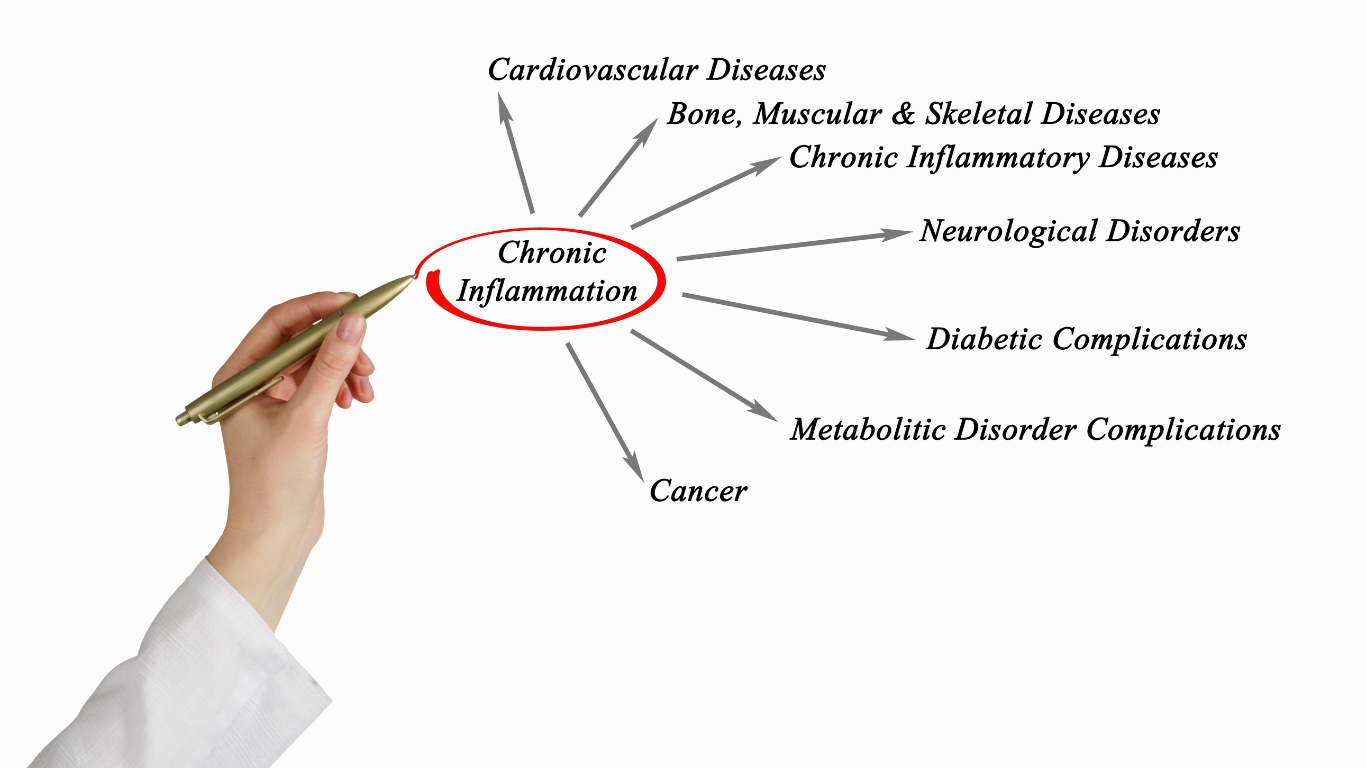Does Inflammation Cause Weight Gain?
We often hear about the dangers of chronic inflammation and its link to various health issues, including heart disease and insulin resistance. But have you ever wondered if inflammation could also be the culprit behind those extra pounds we're carrying around?
Let's explore the intriguing relationship between inflammation and weight gain, how they're connected, and what you can do to address this issue.
Understanding Inflammation
Inflammation is a natural defense mechanism of our immune system, helping our bodies fight off infections and heal injuries. It's like your body's own superhero, rushing to the scene whenever there's a threat. But there's a crucial distinction between acute and chronic inflammation.
Acute inflammation is the short-term response your body mounts to deal with an immediate problem. It's the kind of inflammation you experience when you get a cut or catch a cold. It serves a vital purpose, and the inflammation subsides once the issue resolves.
Chronic inflammation, on the other hand, is a long-term, low-grade state of inflammation that persists in your body. It's like a superhero who never takes off the cape and keeps fighting indefinitely. This part is where things can get tricky, as chronic inflammation is associated with many health problems, including insulin resistance, heart disease, and even weight gain.
Chronic Inflammation and Weight Gain
Now, let's dive into the big question: Does inflammation cause weight gain? The answer is not as straightforward as we might hope, as many factors are at play. However, there are some ways inflammation could contribute to weight gain.
Insulin and Leptin Resistance
Chronic inflammation can cause our bodies to become resistant to insulin, the hormone that regulates blood sugar levels. This resistance leads to high blood sugar levels and increased production of insulin. Insulin is known as the "fat-storage hormone" because it promotes fat accumulation in our bodies. Insulin resistance can lead to weight gain and even obesity.
Inflammation also affects another hormone called leptin, which is responsible for signaling to our brains that we're full and should stop eating. This hormone from the adipose tissue helps control appetite, fat storage, and energy expenditure. Chronic inflammation can cause leptin resistance, meaning our bodies don't receive the signal to stop eating, leading to overeating, increased fat accumulation, and weight gain.
Hormonal Imbalances
Inflammation can also disrupt the balance of other hormones in our bodies. For example, it can increase levels of the stress hormone cortisol, which can also increase belly fat deposition. It can also affect the production and regulation of other hormones involved in metabolism and appetite control. These hormonal imbalances can contribute to gaining and struggling to lose weight.
Chronic Stress
Chronic inflammation is often closely tied to chronic stress. When we are stressed, our bodies release cortisol, which helps us deal with immediate threats. However, when we experience ongoing stress, our bodies continue to produce high levels of cortisol, leading to chronic inflammation. This cycle can contribute to weight gain as well because high cortisol levels contribute to increased appetite and cravings for high-fat and high-sugar foods.
Poor Diet and Processed Foods
The foods we eat can also contribute to inflammation in our bodies. A diet high in processed foods, trans fats, and refined sugars can promote chronic inflammation and contribute to excess weight. These types of foods are often low in fiber, which is essential for a healthy gut microbiome. An imbalanced gut microbiome can lead to inflammation and obesity. Unfortunately, the interplay between inflammation and poor diet can create a vicious cycle that seems impossible to break.
Mental and Psychological Health
Chronic inflammation and weight gain are also connected to mental and psychological health. It's a two-way street, as inflammation can contribute to anxiety, depression, and other mental health issues, while these conditions can also lead to inflammation. When we are stressed, anxious, or depressed, we likely engage in unhealthy behaviors like stress or emotional eating, further complicating the relationship between inflammation and body weight.
So, while inflammation itself might not be the sole cause of weight gain, it's clear that it plays a significant role in a complex web of factors that can contribute to excess weight. But before you start panicking about your last pizza indulgence, take a deep breath! There are ways to address and reduce inflammation to aid your weight loss journey.
Reducing Inflammation To Promote Weight Loss
The good news is that you can reduce chronic inflammation by making lifestyle and dietary changes. Here are some practical steps you can take to decrease inflammation and shed those extra pounds.
Incorporate Anti-Inflammatory Foods
A great way to start is by adding more anti-inflammatory foods to your diet. Incorporate anti-inflammatory produce like leafy greens, fruits, meat, nuts, seeds and whole grains if you eat grains, which are rich in antioxidants and other anti-inflammatory compounds. Spices and herbs like turmeric, ginger, garlic, and cinnamon also have potent anti-inflammatory properties. Making these foods a regular part of your diet can help reduce inflammation levels.
Include Fatty Fish for Omega-3s
Omega-3 fatty acids have anti-inflammatory properties and are essential for a healthy diet. Incorporating fatty fish like salmon, mackerel, tuna, or sardines into your diet can provide these beneficial fats. If you're not a fan of fish, consider taking an omega-3 supplement to ensure you get enough of these essential fatty acids.
Cut Back on Processed and Sugary Foods
As mentioned, processed foods and refined sugars can promote inflammation in our bodies. Cutting back on these foods can help reduce chronic inflammation levels and contribute to weight loss. I know it can be hard to resist the allure of fast food or sweets, so try gradually reducing your intake and incorporating healthier options as alternatives.
Try Intermittent Fasting
Intermittent fasting is a dietary approach that can help reduce inflammation, improve insulin sensitivity, and promote weight loss. Intermittent fasting involves cycling between periods of eating and fasting to allow your body to repair and regenerate. Some popular methods include the 16/8 schedule or alternate-day fasting. Talk to your healthcare provider before starting any new dietary habits, as this diet plan may not be suitable for everyone.
Manage Stress
As stress can contribute to inflammation and weight gain, finding ways to manage stress can help break the cycle and promote weight loss. This process could include incorporating relaxation techniques like deep breathing or yoga into your routine, seeking therapy or counseling for mental health concerns, or finding enjoyable hobbies to reduce stress. It's essential to find what works best for you, as managing stress is crucial in reducing inflammation and promoting overall well-being.
Exercise Regularly
Regular exercise not only burns calories and aids in weight loss but also has anti-inflammatory effects. Physical activity can help decrease levels of chronic inflammation in the body, making it a crucial component of any healthy lifestyle. Find an exercise routine that you enjoy and stick to it to reap the benefits.
Get Adequate Sleep
Getting enough sleep is essential for overall health and well-being, and it's just as crucial for reducing inflammation and losing weight. Lack of sleep can disturb hormones that control appetite, leading to overeating and weight gain. Target getting seven to nine hours of quality sleep each night to help reduce inflammation and support weight loss efforts.
Consult With a Professional
If you're struggling to reduce inflammation and lose weight on your own, it's a good idea to seek the help of a healthcare professional. A doctor or registered dietitian can provide personalized advice and guidance for reducing inflammation and promoting healthy weight loss. They can also help identify underlying health issues contributing to chronic inflammation and weight gain.
Incorporating these steps into your daily life can help reduce chronic inflammation, making it easier to achieve and maintain a healthy weight. Remember, it's not just about losing weight — it's about improving your overall health and well-being.
The Bottom Line
The relationship between inflammation and weight gain is indeed a complex one. While inflammation may not be the sole cause of excess weight, it's a contributing factor you shouldn't ignore. Chronic inflammation can lead to insulin and leptin resistance, hormonal imbalances, and even affect your mental and psychological health, all of which can make losing weight a real challenge.
The good news is that by making changes to your lifestyle and diet, you can reduce chronic inflammation and increase your chances of successfully losing weight. Incorporate anti-inflammatory produce, reduce processed foods, manage stress, and take steps to maintain a healthy weight. And remember, it's not just about shedding pounds — it's about feeling better and living a healthier, more vibrant life.
If you're struggling to reduce inflammation and lose weight, don't get discouraged. We at Thrive Nutrition are here to support you on your journey towards better health. Schedule an appointment today for personalized nutrition strategies and guidance to help you reach your goals. Together, we can start your journey toward a healthier, happier you.




